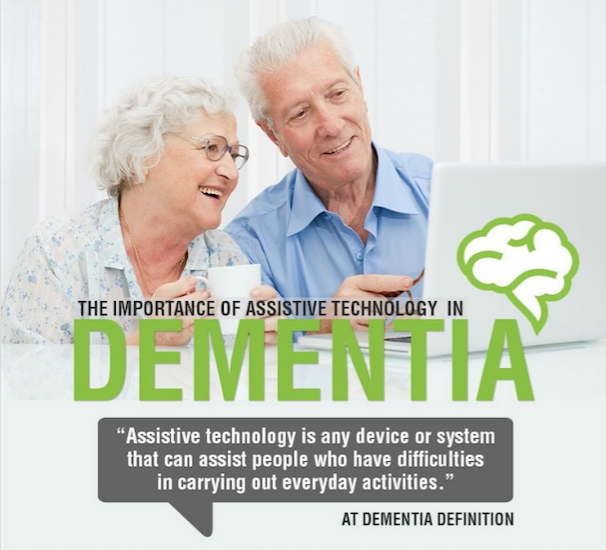This is an interesting infographic that gives an overview of what Dementia is, lists some important stats about it, and also mentions some assistive technology that can help people who have Dementia be safe, communicate better, and enjoy leisurely activities.
Text Version:
IMPORTANCE OF ASSISTIVE TECHNOLOGY IN DEMENTIA
“Assistive technology is any device or system that can assist people who have difficulties carrying out everyday activities.” AT DEMENTIA DEFINITION
UNDERSTANDING DEMENTIA
Dementia is an umbrella term for diseases and conditions that are characterized by a decline in a person’s memory or other thinking skills.
This affects a person’s ability to perform simple everyday activities.
It is caused by damage to neurons in a person’s brain.
These damaged neurons can no longer function at a normal level and may die.
This leads to changes in a person’s ability to think clearly, their behavior and their memory.
Alzheimer’s disease is the most common type of dementia.
ADVANCES IN ASSISTIVE TECHNOLOGY ARE IMPORTANT BECAUSE
DEMENTIA IS ON THE RISE WITH 7.7 MILLION NEW CASES OF DEMENTIA ANNUALLY
EVERY 4 SECONDS A NEW CASE OF DEMENTIA OCCURS SOMEWHERE IN THE WORLD
44.4 MILLION+ THE NUMBER OF PEOPLE WITH DEMENTIA WORLDWIDE IN 2013
75.6 MILLION+ THE NUMBER OF PEOPLE PREDICTED TO HAVE DEMENTIA WORLDWIDE BY 2030
135.5 MILLION THE NUMBER OF PEOPLE PREDICTED TO HAVE DEMENTIA WORLDWIDE BY 2050
PREDICTED REGIONAL INCREASE IN DEMENTIA
% INCREASE BY 2050
THE AMERICAS 248%
EUROPE 90%
AFRICA 345%
ASIA 226%
TYPES OF ASSISTIVE TECHNOLOGY
COMMUNICATION DEVICES
Devices that can support communication.
EXAMPLES: Intercoms, Telephones
ORIENTATION & MEMORY AIDS
Devices that can act as memory prompts and reminders.
EXAMPLES: Noticeboards and Signs, Voice Recorders and Memo Minders, Item Locator Devices, Clocks and Calendars, Medication Reminders and Dispensers.
SAFETY MONITORS
Devices that can help improve safety in the home.
EXAMPLES: Cooker Cut-off, Exit Sensors, GPS Trackers, Activity Monitors, Fall Detectors, Alarm and Pager Units, Temperature Monitors, Flood Detectors, Gas, Carbon Monoxide, and Smoke Detectors
RECREATION & LEISURE
Devices that can help support and enable leisure activities.
EXAMPLES: Computer Aids, Talking Games, TV, Radio, and Music Controls, Talking Photo Albums, and Books for Dementia Patients
Source: Confessions of the Profession

